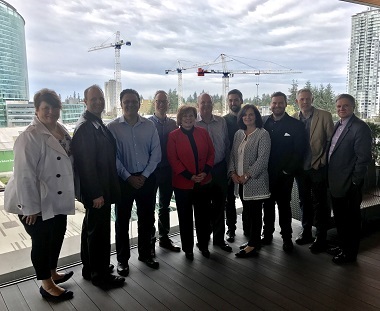
Representatives from 11 churches briefed Surrey Mayor Linda Hepner in April 2017 on how they are serving the city. From left: Brenda-Lee Sasaki (Surrey Alliance), Michael Vuorensivu (Cedar Grove), Steve Bains (Gracepoint), Ryan DelBlanc (Peoples), Mayor Linda Hepner, Dean Cooper (Peace Portal), Jon Thiessen (Johnston Heights), Loretta Hibbs (Dream Centre/Relate), Chris de Monyé (Village), Jim Heuving (Pacific Community) and Peter Klenner (All Saints). Craig Millar (Horizon) is missing from picture.
Church in Surrey & White Rock: The Untold Story will be launched June 16 at Regent Christian Academy. In the meantime, here is an excerpt from the chapter ‘Church and Community Ministry and Cooperation,’ by Lloyd Mackey and Frank Bucholtz.
Surrey is the fastest-growing city in BC and will one day be its largest. As it grows and changes in ways that seemed unimaginable a generation ago, there are many needs which are not easily provided. Churches can help fill some of those needs. Consider this notable example.
In 2016 representatives from five Surrey churches had a breakfast meeting with Mayor Linda Hepner to offer their assistance in meeting a wide variety of community needs. They weren’t there to ask for anything – they wanted to know how they could help.
This initiative began with two South Surrey pastors, Dean Cooper of Peace Portal Alliance Church and Steve Bains of Gracepoint Community Church. They had coffee together and began discussing how they could play a bigger role in the growing city of Surrey. They believed that the churches, which they see as “the body of Christ,” needed to become more involved.
Mayor Hepner wanted to hear back from the churches after the initial meeting. In April 2017, they held another breakfast meeting. Each of the churches gave specific reports to the mayor on their service to the city and its residents.
Since those early meetings the group has expanded to 14 churches. They are Surrey Alliance Church, Cedar Grove Baptist Church, Gracepoint Mennonite Brethren Church, Peoples Church, Peace Portal Alliance Church, Johnston Heights Church, Relate Church, Village Church, Life Church, Surrey Pentecostal Church, White Rock Baptist Church, Southside Church, Pacific Community Church and All Saints Anglican Church.
Several other churches are interested in being part of the coordinated effort. Their worship centres, scattered throughout the city, represent a wide range of denominational affiliations and worship styles. The main ministries of this group of churches are aiding the poor, helping refugees, branching out to at-risk teens and supporting at-risk children.
Churches providing help in social services isn’t anything new in Surrey. There has been a long history of many churches and their members being deeply involved in meeting needs outside their congregations.
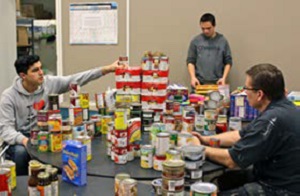
NightShift volunteers
For example, this commitment to the community at large by members of various churches played a key role in the formation of the Surrey Food Bank during the depth of the recession in the early 1980s. Establishing the food bank was one of a number of ideas people suggested at a meeting at North Surrey United Church to explore ways to help people.
At that time interest rates were in the neighbourhood of 20 percent, many people had lost their jobs and some were losing their homes because they could not make the mortgage payments. The unemployment rate was more than double what it is today.
The Salvation Army has been internationally known for many years as the glue that helped to bind together the Christian community’s dual concern for evangelism and social action, through a military-like leadership structure. In the north sector of Surrey, the Salvation Army Citadel (church) stood on 104th Avenue, just east of City Centre. Early in the 21st century, the building changed hands. It is now home to the congregation of Han Seok Korean Buddhists.
The Salvation Army moved into shared quarters with Surrey Alliance Church on 96th Avenue, just west of Surrey Memorial Hospital. The Alliance congregation, after a major building expansion in the 1980s, found itself with room to spare and the Salvation Army made for a good partnership. As it happens, the two churches are cheek-by-jowl to the innovative health-care hub surrounding the hospital. Other Christian groups, like the Ukrainian Orthodox, Plymouth Brethren and Watchman Nee are located nearby.
At present the food bank has become a seemingly permanent part of the Surrey social service scene. Awareness of that fact became more obvious recently when the Anglican Church of the Epiphany and Surrey Food Bank announced a partnership aimed at redeveloping the church’s 1960s-era deteriorating church building near Guildford.
Plans call for a new building capable of accommodating worship, educational, social service and food banking activities. The Guildford location is considered ideal for the redevelopment project because it is adjacent to many families whose economic circumstances require the kinds of assistance a food bank offers.
In earlier years, church members were heavily involved with what was then known as the Surrey Coordinating Centre. It brought together volunteers to offer assistance in meeting urgent community needs. That Centre eventually became Surrey Community Services and is now known as Options Community Services.
Another area of ministry by area churches is hospital chaplaincy. The chaplaincy programs at Surrey Memorial and Peace Arch hospitals have a long history, going back to the opening of the two hospitals in the 1950s.
In passing we should note the following reality. Given Surrey’s spread-out geography, transportation challenges and the wide variations among communities, it has often been difficult to develop a Surrey-wide approach to issues. Therefore most church-based efforts in the past have been concentrated in specific communities.
At present Mayor Hepner and her council have had to grapple with many significant problems, as also did her predecessor, Dianne Watts. Among them are homelessness, addiction, unsightly properties, gang activity, poverty, housing costs and crime.
In addition to Surrey being the fastest-growing city in BC, it also has one of the highest percentage of people 18 and under. The school district is the largest in BC and grows by about 1,000 students each year. This means that all of the social problems have a magnified effect on Surrey young people. This reality is of deep concern to the mayor and other community leaders.
When the church leaders and the mayor first met in 2016, “the mayor had some specific concerns about young teens who were caught up in gangs,” Dean Cooper said.
As the conversation progressed and as the church representatives reported what they were doing, one focus was on serving young people and trying to keep them from being attracted to the gang lifestyle. Also highlighted was the need for children not to go to school hungry, so that they have a better chance to do well in school.
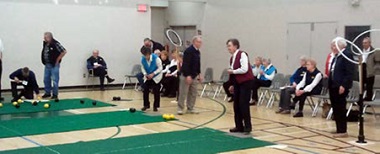
Cedar Grove Baptist Church works with seniors in a number of ways; here people are carpet bowling.
As described elsewhere, churches are also undertaking initiatives in serving seniors. Here, too, they are using their expertise for the benefit of the community.
In recent years, Surrey has taken in a large number of Syrian refugees, as part of the national program to bring more Syrian refugees to Canada. There are many other refugees in Surrey as well. Churches are doing much to make them feel welcome, learn English, have food and shelter and fit into the community.
The breadth and diversity of church-based social services become evident in the following summary of what is presently being done. This list is not exhaustive but it does illustrate what is being done by the group of 14 churches.
All Saints Community Church on 16th Avenue in South Surrey has programs for immigrants, particularly people trying to get permanent resident status, for the poor and for people with mental health issues.
Cedar Grove Baptist Church on 144th Street has a benevolent ministry targeting people needing food, financial assistance and emotional support. It serves 2,500 people annually. This church also has a large generational ministry to people 50 years of age and over, serving 3,000 people each year. It also offers ESL training and earlier in 2017 launched a soccer activity for children 13 and over who are refugees or otherwise at risk.
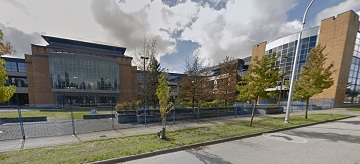
City Dream Centre is hoping to call this building on 104th Avenue home.
Relate Church in the Sullivan area, under the leadership of Loretta Hibbs, is actively pursuing the establishment of a Dream Centre in Surrey. It has extended its service into the city’s northern sector through a Christmas food hamper and gift program aimed at refugees, low income people and families with children in six Whalley elementary schools. It is serving 300 families and 2,400 children. The same target groups are also beneficiaries of programs offering 1,000 backpacks, free haircuts, free produce bags and free clothing.
Relate Church also offers life skills programs for women in recovery from addiction and for men and women released from provincial prisons. About 200 women have graduated from the recovery program and 120 men and 160 women from the prison program. This church also holds a Solo Moms event with many areas of assistance for single mothers raising children alone, and offers an ESL program.
Gracepoint Church in South Surrey provides a weekly community dinner, serving 200 people. It has a refugee friendship and cultural assimilation program aimed at Muslim refugees. It provides school breakfasts weekly for 25 children, and its Recreation for Kids program provides bicycles and bike repairs.
It is involved in a task force to help homeless people on the Semiahmoo Peninsula, it helps high school students at risk, it offers community service programs for people needing to fulfill court obligations and it provides food hampers for people in need.
Johnston Heights Church on 152nd Street in Guildford provides a twice-monthly community meal, has weekly youth and children’s programs for the community, offers an annual youth camp for 100 youth and a summer day camp for 60 children in the community. It also provides a weekly lunch for seniors.
Life Church on 152nd Street in South Surrey offers weekly bread distribution, an annual brunch and manicures for women, regular automobile oil changes for single moms and hosts the annual Kiwanis Christmas dinner for about 100 people.
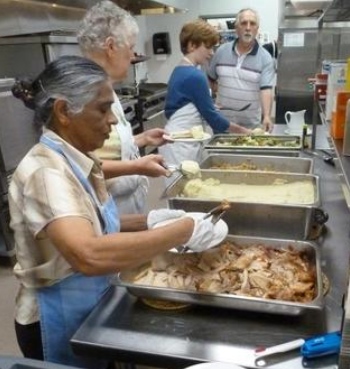
Pacific Community Church has created Cloverdale Community kitchen for the good of their neighbours.
Pacific Community Church in Cloverdale has a community kitchen.Together with two other Cloverdale churches it teams up to provide three meals a week. These churches serve 10,000 meals each year to people in need. Pacific Community Church also hosts the Cloverdale Christmas hamper program which serves 250 families each year. It is also part of the Extreme Weather Shelter Program which, with its 15 beds, offered 60 nights of shelter in 2016-17 at its 180th Street facility.
This church has also sponsored two refugee families, has made community garden plots available, and is the lead agency in the annual Coldest Night of the Year Walk to assist the homeless. The walk attracts about 300 walkers each year.
Peace Portal Alliance Church hosts tax clinics, offers ESL training, provides free community counseling and operates a recovery program for addicts. Altogether, these four programs serve about 1,000 people annually. In addition, its members volunteer with NightShift Ministries in Whalley and have sponsored a Syrian refugee family of eight people.
Peoples Church on 104th Avenue in North Surrey provides a free community dinner called The Table. It has also established the Mackie’s Place youth drop-in centre. It also provides free Christmas and Easter breakfasts, and operates free day camps in the summer and at spring break. It sponsors a free Halloween event called Light Up the Night, a recovery program and is part of both the Adopt-A-Street and Adopt-A-School programs.
Southside Community Church on 100th Avenue in Cedar Hills hosts neighbourhood events, operates The Shire music centre for children and Hillside Gardens for 80 families. It also runs summer camps and provides support for recovering addicts and has sponsored a refugee family. Its members also assist with NightShift Ministries.
Surrey Alliance Church has a large ministry helping people file income tax returns. In 2017, 60 volunteers helped fill out 2,800 tax returns. It has also adopted the nearby A.H.P. Matthew school, providing backpacks, counseling, Christmas hampers and emergency assistance. It also provides funerals and memorial services for those with no other options. Some of its members volunteer with NightShift.
Surrey Pentecostal Church on 80th Avenue distributes bread, has sponsored three refugee families, hosts AA meetings and hosts children’s activities at the annual Fleetwood Festival and at the Sikh Vaisakhi festival. It runs children’s and youth activities in the summer, during the school year and at Halloween. It also hosts monthly barbecues at Cedar Gardens Apartments.
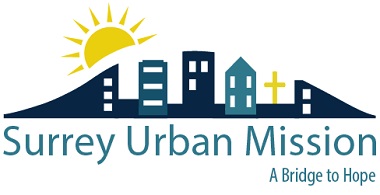 During 2017 Village Church had 50 volunteers working with Surrey Urban Mission and 30 more helping refugees through New Hope Community Services. It has also adopted Holly Elementary School, helping the 550 students there and their families deal with a variety of needs. This church is also part of Mackie’s Place which reaches out to at-risk youths.
During 2017 Village Church had 50 volunteers working with Surrey Urban Mission and 30 more helping refugees through New Hope Community Services. It has also adopted Holly Elementary School, helping the 550 students there and their families deal with a variety of needs. This church is also part of Mackie’s Place which reaches out to at-risk youths.
White Rock Baptist Church offers ESL classes to 75 people each term, has a Friday Friendship group for seniors and offers kids’ day camps, soccer camps and basketball camps. It also offers Urban Adventures day camps to allow children to go on local field trips.
The 14 churches which carry out these ministries look forward to increased coordination of efforts among churches and between the faith community and the city.
“We are trying to bring awareness within the community [of what churches are doing],” Pastor Cooper said. “We are trying to bring down denominational church walls. We are the church, all of us. We need to do this together.” . . .
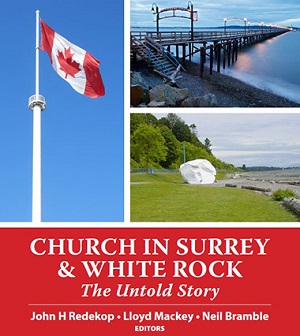 This summary of activity by 14 churches in Surrey and White Rock illustrates the reality that Christian churches in this area take seriously the biblical commandment that followers of Jesus shall practice compassion, kindness, generosity and love to their neighbours and to strangers in their communities.
This summary of activity by 14 churches in Surrey and White Rock illustrates the reality that Christian churches in this area take seriously the biblical commandment that followers of Jesus shall practice compassion, kindness, generosity and love to their neighbours and to strangers in their communities.
Likely most of the other churches not on this list also contribute to one degree or another in a similar way. As time progresses, this spirit of serving the community, which most churches already display, will develop even further, thereby providing even more community benefit.
The rest of the chapter is about the Dream Centre, mentioned above. I will post it next week. This excerpt from the book is posted by permission.

It’s too bad the churches in Surrey aren’t fighting for justice instead of covering over the violence of the state’s austerity policies with charity and “good works.” We need to radically remake the political economy so that poverty can be eliminated, not just alleviate hunger and homelessness for a night or two.
As long as the churches are collaborating with the state, they are supporting a structure that produces and reproduces human suffering, and legitimizing a system that unevenly distributes the conditions of premature death. Charity simply maintains the oppressive and unjust status quo and blocks possibilities for social justice, solidarity and true human dignity.
Hi Dave,
Is the solution then to work against “the state?” If a remake of of the political economy is what is needed (and not even sure what you mean by that), then I would imagine collaborating with them would be the better alternative, no?
What does “fighting for justice” look like to you and what practical solutions would you propose (or have you been involved in)?
To me, I’m glad to see churches coming together and working with the city (or other non-church organizations) to alleviate and minimize suffering. While some of the charity is indeed short-term and merely a band-aid, sometimes it is needed to bridge the gap until a sustainable solution can be developed. And doing something, even if short-lived is better than doing nothing.